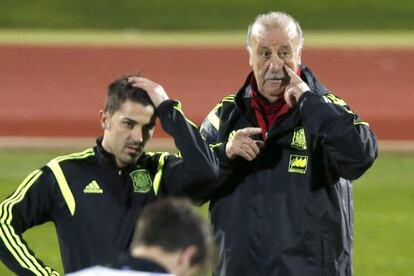Government gave green light for controversial match in African dictatorship
Equatorial Guinea a “brother nation, in sporting terms,” says governing body

The Spanish Football Federation (RFEF) on Wednesday unveiled the strip the national soccer team will wear when defending its world title in Brazil next summer, and which will have its first airing in Saturday’s friendly match against Equatorial Guinea before La Roja plays South Africa in Johannesburg’s Soccer City stadium next week.
When RFEF president Ángel María Villar signed the accord with his South African counterpart to honor tradition and return to the scene of Spain’s finest hour, the federation looked into an opponent nation to fill the gap in the international calendar. Gabón was mooted and an agreement all but sealed with Angola, which later backed out after sacking its national coach. The RFEF explained that the Sable Antelopes did not wish to “make a fool of itself,” and the option of playing in Malabo came up.
Jorge Pérez, secretary general of the RFEF, said at the time that Equatorial Guinea, a former Spanish colony and a “brother nation, in sporting terms,” had asked “a thousand times” that La Roja do the country the honor of paying a visit. As it is roughly on the way to South Africa and Villar had been planning a trip to Malabo, the idea gathered steam. There was only one problem: the national team had agreed to host Eritrea, but this was swiftly revoked in order to receive the world champion.
Pérez spoke with Paco Gnomo, the Guinean Federation coordinator, and Andoni Goikoetxea, the head coach and a former Spain international, laying out two conditions for the match: that Equatorial Guinea foot the bill for La Roja’s stay and that the pitch be in perfect condition. The RFEF sent operations manager Antonio Limones, to inspect the turf and the team’s accommodation before agreeing to the game.
I only talk about sporting matters. For anything else, you’ll have to go to a different window”
“We are not being paid anything,” the RFEF said, adding that it had checked with the secretary of state for sport, Miguel Cardenal, to ensure that Equatorial Guinea’s dictatorial president, Teodoro Obiang, did not represent a diplomatic risk. “There were no obstacles,” the RFEF said. Cardenal confirmed the talks to this newspaper.
RFEF sources said that the players did not object to the fixture. “We have never received any pressure from the Spanish government to play there,” Pérez told EL PAÍS. “We are going because the Equatoguinean Federation is a friend; there’s nothing else to it.” Opposition groups in Congress have called for the match to be boycotted and on Thursday the United Left asked the government for a statement on the match, and whether La Roja was in effect “supporting dictatorial regimes like Teodoro Obiang’s.”
It is a rare occurrence for Spain to play a friendly match for free, other than the covering of accommodation costs and internal travel. The RFEF reached a similar arrangement with South Africa. There are no official diplomatic acts planned with the Equatoguinean administration, although Obiang is expected to attend game.
The RFEF has said that it has not advised the players or staff to keep their counsel if asked questions about Obiang’s dictatorial regime, but none have offered an opinion ahead of the match.
“I only talk about sporting matters. For anything else, you’ll have to go to a different window,” said Spain coach Vicente del Bosque when asked about the benefits of playing in a country with no democratic liberties. Juventus forward Fernando Llorente would also not be drawn into the ethical sphere at a press conference in Madrid before the team embarked for Equatorial Guinea: “I’m only concentrating on the sporting aspect, so I can’t answer,” he said.
Neither would Villar be drawn on the subject at an event in Logroño on Thursday. “I thought about it in the car on the way here and I’m not going to answer, because I have come here to this event to support the development of soccer in this wonderful part of Spain,” he told reporters.
Tu suscripción se está usando en otro dispositivo
¿Quieres añadir otro usuario a tu suscripción?
Si continúas leyendo en este dispositivo, no se podrá leer en el otro.
FlechaTu suscripción se está usando en otro dispositivo y solo puedes acceder a EL PAÍS desde un dispositivo a la vez.
Si quieres compartir tu cuenta, cambia tu suscripción a la modalidad Premium, así podrás añadir otro usuario. Cada uno accederá con su propia cuenta de email, lo que os permitirá personalizar vuestra experiencia en EL PAÍS.
¿Tienes una suscripción de empresa? Accede aquí para contratar más cuentas.
En el caso de no saber quién está usando tu cuenta, te recomendamos cambiar tu contraseña aquí.
Si decides continuar compartiendo tu cuenta, este mensaje se mostrará en tu dispositivo y en el de la otra persona que está usando tu cuenta de forma indefinida, afectando a tu experiencia de lectura. Puedes consultar aquí los términos y condiciones de la suscripción digital.








































